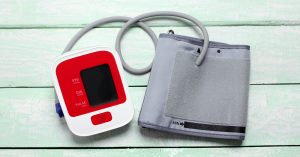Throughout our lives, there are a couple of numbers we know by memory: our birthdays, our phone numbers, and our address, among others.
However, there are some very important numbers that everyone should memorize but most often don’t: the ones that let you know if you’re at risk of getting a heart attack, so you could say knowing these numbers is a matter of life and death.
These numbers are all modifiable risk factors, which means you can take measures to change them. Use these numbers to inform your judgment and lower your risk of having a heart attack.
1. Blood Pressure: 120/80

Personal blood pressure monitors are affordable and easy to operate.
Ever wonder why your doctor always takes a blood pressure reading at the start of every visit?
It’s because high blood pressure increases your risk of getting a heart attack or stroke.
Worst of all, you may not even know you have high blood pressure because it shows no symptoms.
Blood pressure should not be any higher than 120/80 mmHg (millimeters of mercury).
Blood pressure monitors can be affordable and easy to acquire, so if you see yourself going over these numbers, pay a visit to your doctor to receive some lifestyle recommendations or perhaps even some medications.
2. LDL Cholesterol: 100

Fatty foods contribute to “bad” cholesterol.
You’ve probably heard that having high cholesterol levels is bad for you, but did you know there are two types of cholesterol?
LDL cholesterol is the “bad” type; a high LDL cholesterol level leads to a buildup in your arteries, which causes a higher risk of having a heart attack.
Keep an eye on your LDL levels: it should be no higher than 100 mg/dL (milligrams per deciliter).
A basic blood test can determine your LDL cholesterol levels and should be taken at least every five years after age 20.
3. Fasting Glucose: 100

Glucose meter kits are a simple way of measuring your sugar.
Research has shown that there is a strong relationship between diabetes and coronary artery disease.
In fact, the relationship is so strong that it is likely you will develop heart disease even if you have no other risk factors besides diabetes.
A good way to determine if you are at risk for diabetes is to check your sugar levels with a quick blood test after fasting for eight hours.
Your glucose should be no higher than 100 mg/dL. If your reading is higher than that, losing weight will usually have a positive effect on your sugar levels.
4. BMI: 18.5-24.9

Being overweight has a negative effect on your heart health.
Being overweight affects your heart health in two main ways. First, your HDL cholesterol levels decline, which means your arteries are likelier to clog.
Second, too much fat may cause metabolic syndrome and lead to diabetes (which we just said is a major source of heart disease).
The key is to keep your body mass index (the measurement of your weight when adjusted for your height) between 18.5 and 24.9.
5. Waist Circumference: 37 or 32

If your fat is concentrated in your waist, it may be a sign of a larger problem.
Being overweight is not the only thing you have to worry about, but also where your fat is concentrated.
If your fat is largely concentrated around your waist, it can mean there is a high level of inflammation in your body, which can prompt heart disease.
Men should have a waist measurement of up to 37 inches after they turn 40 and women should have a waistline of no more than 32 inches after age 35.
6. Triglycerides: 150

If you care about your heart, you might need to watch how many root beer floats you consume.
When you consume products with excess sugar like sodas, sweet tea, or sweetened cereals, your body turns it into triglycerides.
When combined with high LDL cholesterol levels, high triglycerides can speed up plaque buildup in the arteries.
Check your triglyceride levels whenever you check your cholesterol. If you need to lower it, eliminate the extra sources of sugar in your diet and start consuming extra amounts of high-fiber foods like whole grains, vegetables, and fruit.

